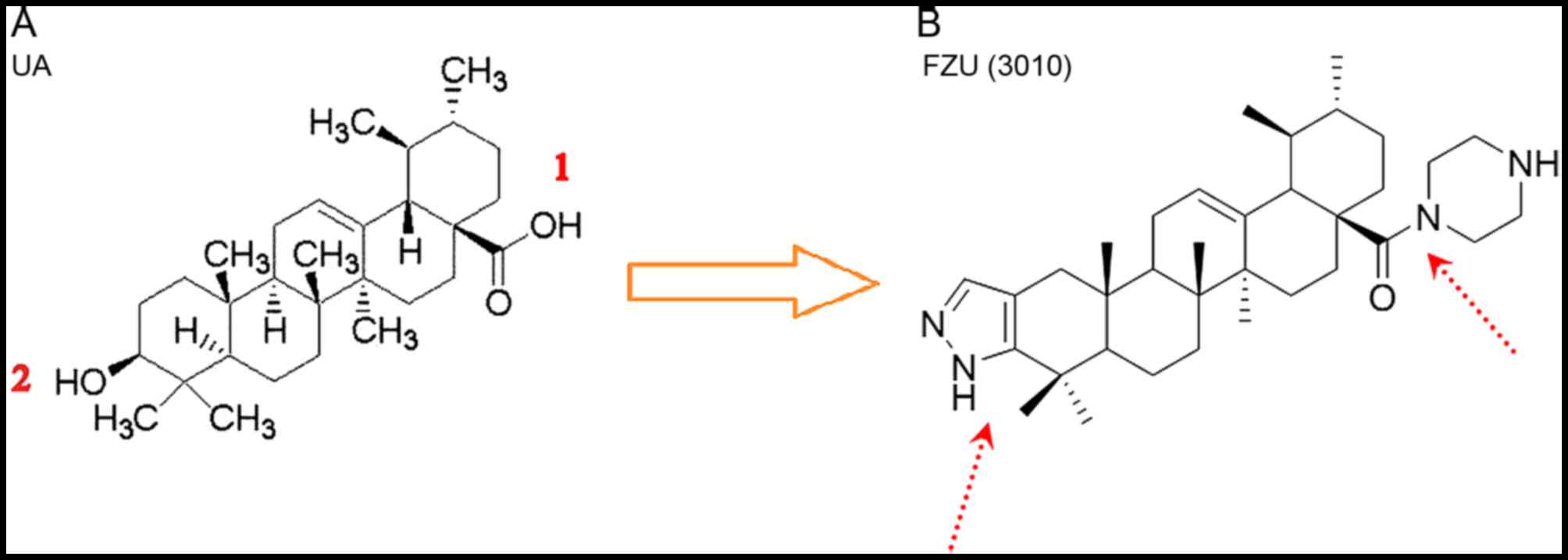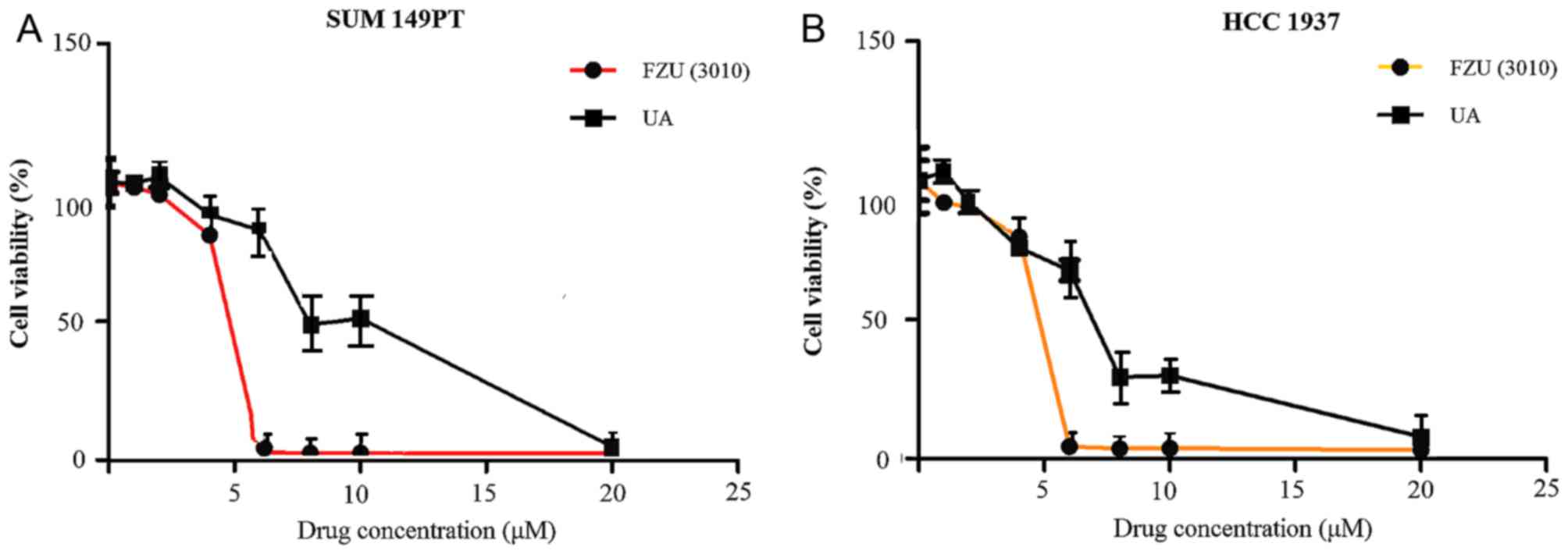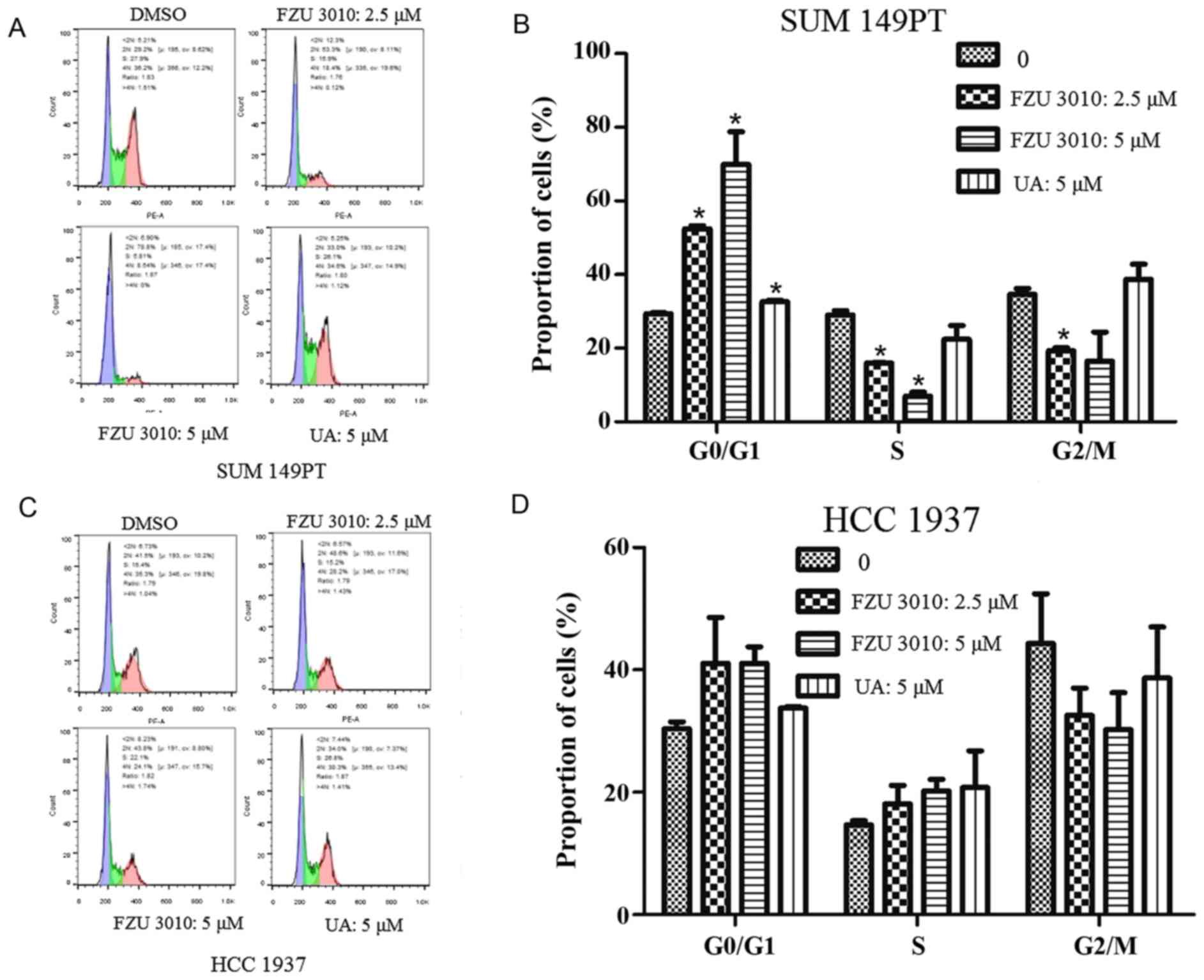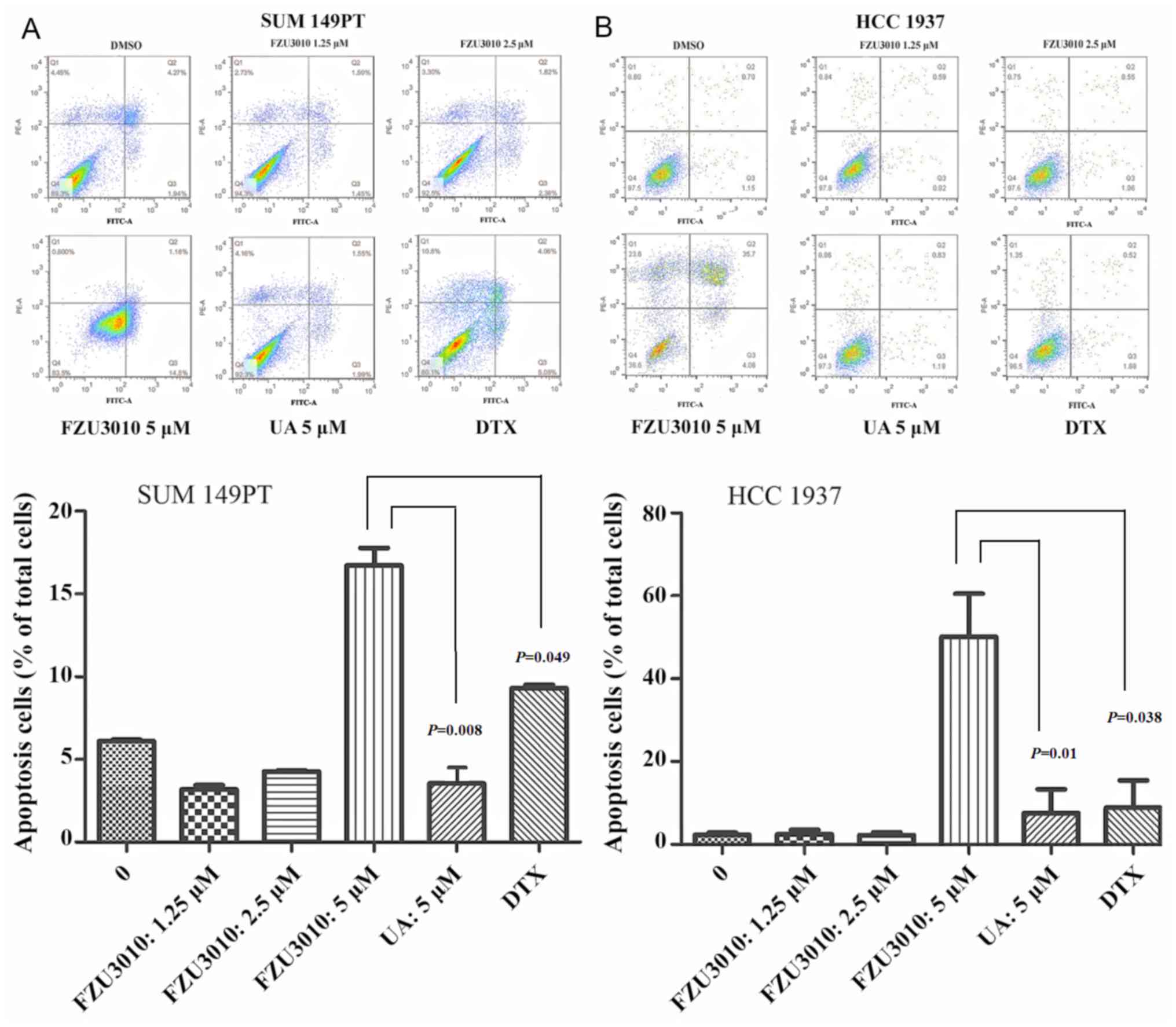|
1
|
McGuire S: World Cancer Report 2014.
Geneva, Switzerland: World health organization, international
agency for research on cancer, WHO press, 2015. Adv Nutr.
7:418–419. 2016. View Article : Google Scholar : PubMed/NCBI
|
|
2
|
Siegel RL, Miller KD and Jemal A: Cancer
statistics, 2015. CA Cancer J Clin. 65:5–29. 2015. View Article : Google Scholar : PubMed/NCBI
|
|
3
|
Wu X, Zou T, Cao N, Ni J, Xu W, Zhou T and
Wang X: Plasma homocysteine levels and genetic polymorphisms in
folate metablism are associated with breast cancer risk in chinese
women. Hered Cancer Clin Pract. 12:22014. View Article : Google Scholar : PubMed/NCBI
|
|
4
|
Hilakivi-Clarke L, de Assis S, Warri A and
Luoto R: Pregnancy hormonal environment and mother's breast cancer
risk. Horm Mol Biol Clin Investig. 9:11–23. 2012.PubMed/NCBI
|
|
5
|
Aloraifi F, Boland MR, Green AJ and
Geraghty JG: Gene analysis techniques and susceptibility gene
discovery in non-BRCA1/BRCA2 familial breast cancer. Surg Oncol.
24:100–109. 2015. View Article : Google Scholar : PubMed/NCBI
|
|
6
|
Tung N, Battelli C, Allen B, Kaldate R,
Bhatnagar S, Bowles K, Timms K, Garber JE, Herold C, Ellisen L, et
al: Frequency of mutations in individuals with breast cancer
referred for BRCA1 and BRCA2 testing using next-generation
sequencing with a 25-gene panel. Cancer. 121:25–33. 2015.
View Article : Google Scholar : PubMed/NCBI
|
|
7
|
Castro MA, de Santiago I, Campbell TM,
Vaughn C, Hickey TE, Ross E, Tilley WD, Markowetz F, Ponder BA and
Meyer KB: Regulators of genetic risk of breast cancer identified by
integrative network analysis. Nat Genet. 48:12–21. 2016. View Article : Google Scholar : PubMed/NCBI
|
|
8
|
Holmes MD, Chen WY, Li L, Hertzmark E,
Spiegelman D and Hankinson SE: Aspirin intake and survival after
breast cancer. J Clin Oncol. 28:1467–1472. 2010. View Article : Google Scholar : PubMed/NCBI
|
|
9
|
Bilgin B, Sendur MAN, Şener Dede D, Akinci
MB and Yalçın B: A current and comprehensive review of
cyclin-dependent kinase inhibitors for the treatment of metastatic
breast cancer. Curr Med Res Opin. 33:1559–1569. 2017. View Article : Google Scholar : PubMed/NCBI
|
|
10
|
Wang J, Dong B, Tan Y, Yu S and Bao YX: A
study on the immunomodulation of polysaccharopeptide through the
TLR4-TIRAP/MAL-MyD88 signaling pathway in PBMCs from breast cancer
patients. Immunopharmacol Immunotoxicol. 35:497–504. 2013.
View Article : Google Scholar : PubMed/NCBI
|
|
11
|
Toi M, Masuda N, Ishiguro H, Saji S, Ohno
S and Chow LW: Development of breast cancer therapy:
Biomarker-driven and response-guided approaches in a neoadjuvant
setting. Int J Biol Markers. 30:e252–e253. 2015. View Article : Google Scholar : PubMed/NCBI
|
|
12
|
Ramalingam S, Gediya L, Kwegyir-Afful AK,
Ramamurthy VP, Purushottamachar P, Mbatia H and Njar VC: First MNKs
degrading agents block phosphorylation of eIF4E, induce apoptosis,
inhibit cell growth, migration and invasion in triple negative and
Her2-overexpressing breast cancer cell lines. Oncotarget.
5:530–543. 2014. View Article : Google Scholar : PubMed/NCBI
|
|
13
|
Cargnin ST and Gnoatto SB: Ursolic acid
from apple pomace and traditional plants: A valuable triterpenoid
with functional properties. Food Chem. 220:477–489. 2017.
View Article : Google Scholar : PubMed/NCBI
|
|
14
|
Mancha-Ramirez AM and Slaga TJ: Ursolic
acid and chronic disease: An overview of UA's effects on prevention
and treatment of obesity and cancer. Adv Exp Med Biol. 928:75–96.
2016. View Article : Google Scholar : PubMed/NCBI
|
|
15
|
Hussain H, Green IR, Ali I, Khan IA, Ali
Z, Al-Sadi AM and Ahmed I: Ursolic acid derivatives for
pharmaceutical use: A patent review (2012–2016). Expert Opin Ther
Pat. 27:1061–1072. 2017. View Article : Google Scholar : PubMed/NCBI
|
|
16
|
Garay CA and Engstrom PF: Chemoprevention
of colorectal cancer: Dietary and pharmacologic approaches.
Oncology (Williston Park). 13:89–100, 105. 1999.PubMed/NCBI
|
|
17
|
Ko EY and Moon A: Natural products for
chemoprevention of breast cancer. J Cancer Prev. 20:223–231. 2015.
View Article : Google Scholar : PubMed/NCBI
|
|
18
|
Xavier CP, Lima CF, Pedro DF, Wilson JM,
Kristiansen K and Pereira-Wilson C: Ursolic acid induces cell death
and modulates autophagy through JNK pathway in apoptosis-resistant
colorectal cancer cells. J Nutr Biochem. 24:706–712. 2013.
View Article : Google Scholar : PubMed/NCBI
|
|
19
|
Achiwa Y, Hasegawa K, Komiya T and Udagawa
Y: Ursolic acid induces Bax-dependent apoptosis through the
caspase-3 pathway in endometrial cancer SNG-II cells. Oncol Rep.
13:51–57. 2005.PubMed/NCBI
|
|
20
|
Yang X, Li Y, Jiang W, Ou M, Chen Y, Xu Y,
Wu Q, Zheng Q, Wu F, Wang L, et al: Synthesis and biological
evaluation of novel ursolic acid derivatives as potential
anticancer prodrugs. Chem Biol Drug Des. 86:1397–1404. 2015.
View Article : Google Scholar : PubMed/NCBI
|
|
21
|
Yarla NS, Bishayee A, Sethi G, Reddanna P,
Kalle AM, Dhananjaya BL, Dowluru KS, Chintala R and Duddukuri GR:
Targeting arachidonic acid pathway by natural products for cancer
prevention and therapy. Semin Cancer Biol. 41:48–81. 2016.
View Article : Google Scholar
|
|
22
|
Wen JH, Wei XH, Sheng XY, Zhou DQ, Peng
HW, Lu YN and Zhou J: Effect of ursolic acid on breast cancer
resistance protein-mediated transport of rosuvastatin in vivo and
vitro. Chin Med Sci J. 30:218–225. 2015. View Article : Google Scholar : PubMed/NCBI
|
|
23
|
Chen H, Gao Y, Wang A, Zhou X, Zheng Y and
Zhou J: Evolution in medicinal chemistry of ursolic acid
derivatives as anticancer agents. Eur J Med Chem. 92:648–655. 2015.
View Article : Google Scholar : PubMed/NCBI
|
|
24
|
Gu W, Jin XY, Li DD, Wang SF, Tao XB and
Chen H: Design, synthesis and in vitro anticancer activity of novel
quinoline and oxadiazole derivatives of ursolic acid. Bioorg Med
Chem Lett. 27:4128–4132. 2017. View Article : Google Scholar : PubMed/NCBI
|
|
25
|
Monteath SAF Alves, Maciel MAM, Vega RG,
de Mello H, de Araújo Martins C, Esteves-Souza A, Gattass CR and
Echevarria A: Ultrasound-assisted extraction of ursolic acid from
the flowers of ixora coccinia Linn (Rubiaceae) and
antiproliferative activity of ursolic acid and synthesized
derivatives. Pharmacogn Mag. 13:265–269. 2017. View Article : Google Scholar : PubMed/NCBI
|
|
26
|
Zhang C, Xu SH, Ma BL, Wang WW, Yu BY and
Zhang J: New derivatives of ursolic acid through the
biotransformation by Bacillus megaterium CGMCC 1.1741 as inhibitors
on nitric oxide production. Bioorg Med Chem Lett. 27:2575–2578.
2017. View Article : Google Scholar : PubMed/NCBI
|
|
27
|
Riaz S, Khan IU, Yar M, Ashraf M, Rehman
TU, Shaukat A, Jamal SB, Duarte VC and Alves MJ: Novel
pyridine-2,4,6-tricarbohydrazide derivatives: Design, synthesis,
characterization and in vitro biological evaluation as α- and
β-glucosidase inhibitors. Bioorg Chem. 57:148–154. 2014. View Article : Google Scholar : PubMed/NCBI
|
|
28
|
Huang XC, Jin L, Wang M, Liang D, Chen ZF,
Zhang Y, Pan YM and Wang HS: Design, synthesis and in vitro
evaluation of novel dehydroabietic acid derivatives containing a
dipeptide moiety as potential anticancer agents. Eur J Med Chem.
89:370–385. 2015. View Article : Google Scholar : PubMed/NCBI
|
|
29
|
Shao JW, Dai YC, Xue JP, Wang JC, Lin FP
and Guo YH: In vitro and in vivo anticancer activity evaluation of
ursolic acid derivatives. Eur J Med Chem. 46:2652–2661. 2011.
View Article : Google Scholar : PubMed/NCBI
|
|
30
|
Zheng QY, Li PP, Jin FS, Yao C, Zhang GH,
Zang T and Ai X: Ursolic acid induces ER stress response to
activate ASK1-JNK signaling and induce apoptosis in human bladder
cancer T24 cells. Cell Signal. 25:206–213. 2013. View Article : Google Scholar : PubMed/NCBI
|
|
31
|
Leal AS, Wang R, Salvador JA and Jing Y:
Synthesis of novel ursolic acid heterocyclic derivatives with
improved abilities of antiproliferation and induction of p53,
p21waf1 and NOXA in pancreatic cancer cells. Bioorg Med Chem.
20:5774–5786. 2012. View Article : Google Scholar : PubMed/NCBI
|
|
32
|
Huang G, Pemp D, Stadtmüller P, Nimczick
M, Heilmann J and Decker M: Design, synthesis and in vitro
evaluation of novel uni- and bivalent ligands for the cannabinoid
receptor type 1 with variation of spacer length and structure.
Bioorg Med Chem Lett. 24:4209–4214. 2014. View Article : Google Scholar : PubMed/NCBI
|
|
33
|
Chavan HV, Adsul LK, Kotmale AS, Dhakane
VD, Thakare VN and Bandgar BP: Design, synthesis, characterization
and in vitro and in vivo anti-inflammatory evaluation of novel
pyrazole-based chalcones. J Enzyme Inhib Med Chem. 30:22–31. 2015.
View Article : Google Scholar : PubMed/NCBI
|
|
34
|
Dong H, Yang X, Xie J, Xiang L, Li Y, Ou
M, Chi T, Liu Z, Yu S, Gao Y, et al: UP12, a novel ursolic acid
derivative with potential for targeting multiple signaling pathways
in hepatocellular carcinoma. Biochem Pharmacol. 93:151–162. 2015.
View Article : Google Scholar : PubMed/NCBI
|
|
35
|
Tu HY, Huang AM, Wei BL, Gan KH, Hour TC,
Yang SC, Pu YS and Lin CN: Ursolic acid derivatives induce cell
cycle arrest and apoptosis in NTUB1 cells associated with reactive
oxygen species. Bioorg Med Chem. 17:7265–7274. 2009. View Article : Google Scholar : PubMed/NCBI
|
|
36
|
Chen J, Fu H, Wang Z, Yin F, Li J, Hua Y
and Cai Z: A new synthetic ursolic acid derivative IUA with
anti-tumor efficacy against osteosarcoma cells via inhibition of
JNK signaling pathway. Cell Physiol Biochem. 34:724–733. 2014.
View Article : Google Scholar : PubMed/NCBI
|
|
37
|
Dar BA, Lone AM, Shah WA and Qurishi MA:
Synthesis and screening of ursolic acid-benzylidine derivatives as
potential anti-cancer agents. Eur J Med Chem. 111:26–32. 2016.
View Article : Google Scholar : PubMed/NCBI
|
|
38
|
Liu MC, Yang SJ, Jin LH, Hu DY, Xue W,
Song BA and Yang S: Synthesis and cytotoxicity of novel ursolic
acid derivatives containing an acyl piperazine moiety. Eur J Med
Chem. 58:128–135. 2012. View Article : Google Scholar : PubMed/NCBI
|
|
39
|
Oura K, Tadokoro T, Fujihara S, Morishita
A, Chiyo T, Samukawa E, Yamana Y, Fujita K, Sakamoto T, Nomura T,
et al: Telmisartan inhibits hepatocellular carcinoma cell
proliferation in vitro by inducing cell cycle arrest. Oncol Rep.
38:2825–2835. 2017. View Article : Google Scholar : PubMed/NCBI
|
|
40
|
Kang S, Kang MS, Ryu E and Myung K:
Eukaryotic DNA replication: Orchestrated action of multi-subunit
protein complexes. Mutat Res. S0027–S5107. 2017.PubMed/NCBI
|
|
41
|
Pathak AK, Bhutani M, Nair AS, Ahn KS,
Chakraborty A, Kadara H, Guha S, Sethi G and Aggarwal BB: Ursolic
acid inhibits STAT3 activation pathway leading to suppression of
proliferation and chemosensitization of human multiple myeloma
cells. Mol Cancer Res. 5:943–955. 2007. View Article : Google Scholar : PubMed/NCBI
|
|
42
|
Yeh CT, Wu CH and Yen GC: Ursolic acid, a
naturally occurring triterpenoid, suppresses migration and invasion
of human breast cancer cells by modulating c-Jun N-terminal kinase,
Akt and mammalian target of rapamycin signaling. Mol Nutr Food Res.
54:1285–1295. 2010. View Article : Google Scholar : PubMed/NCBI
|


















